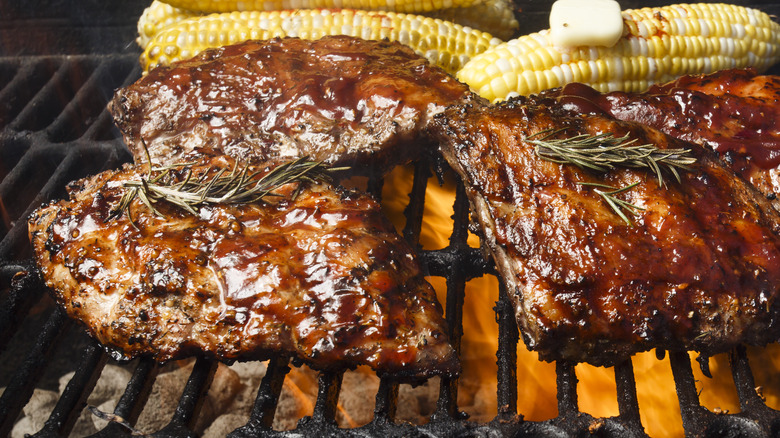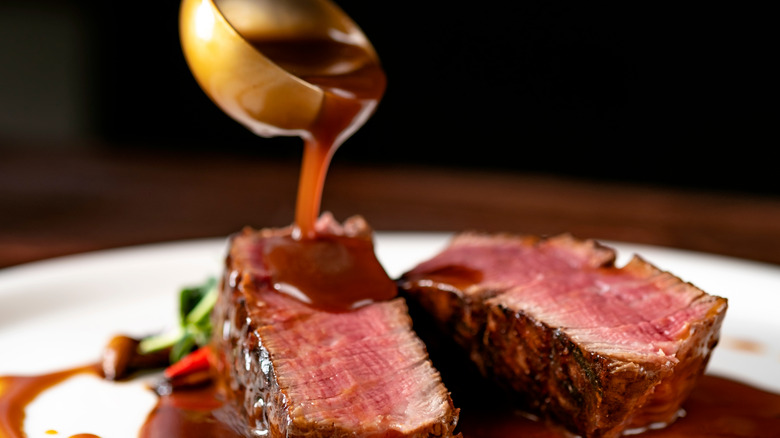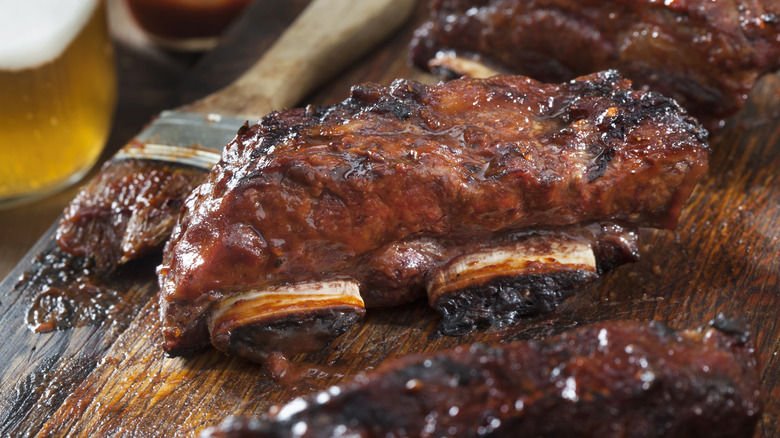The Key Differences Between Barbecue And Steak Sauce
Two sauces – barbecue and steak — neither one superior to the other. Both are commonly spotted on picnic tables and backyard barbecues across America or wedged side-by-side in the condiment caddies of steakhouses and BBQ joints. And though they're often seen hanging around the same gatherings, we all know there's no grudge match to be had. Each sauce has its own distinct place in our hearts, with key differences in ingredients, flavor, texture, and the ways in which they're used that really set them apart, giving each their own place to shine.
Though some may use steak and barbecue sauces interchangeably (no judgment here — you do you), a better understanding of these grilling-season staples can help inform your choice of which to use, when to use it, and on what, enriching your culinary repertoire and raising the scrumptiousness level. Of course, within each genre of sauces, your precise flavor experience will depend on various factors, such as whether you're using store-bought sauce versus DIY versions, brand characteristics (if purchasing), and regional variations. Still, there are certain tenets that each category of sauce will hold firm to.
What exactly is steak sauce?
Steak sauce is brown in color, thinner, and saltier than its barbecue brethren. It's a trifecta of sweet-tart-umami with a signature tip-of-the-tongue tanginess that wakes up your tastebuds, cutting through the rich heaviness of meats with its palate-cleansing zing and a lingering salt-and-pepper bite.
Steak sauce has at times been compared to Worcestershire sauce, a closely-related cousin that's often found lurking in the ingredient lists of many homemade steak sauces. But where Worschesthire gets its umami zing from a combination of anchovies and tamarind, most steak sauces cultivate their syrupy sweetness from pulverized fruits like raisins or oranges (in addition to corn syrup), balanced with a vinegar-induced tartness, and deep-dark savory undertones from ingredients like molasses, onion, and pureed tomato.
Generally viewed as a post-cooking steak topper, steak sauce can be drizzled on top or served as a dipping sauce on the side. It's often used to mask underseasoned steaks, inferior cuts, or dry, overcooked meats, adding precious flavor and moisture back into the beef. And while it's called steak sauce, it can also be used on or in burgers, lamb, venison, and pork, and has historically been used on chicken and even fish.
The thick and sweet nature of barbecue sauce
Typically thick, sweet, smoky, and sometimes with a spicy kick, this hearty, richly-flavored, brick-red-hued sauce is instantly recognizable and much beloved. Barbecue sauce is perfectly used before, during, and after cooking. Try it as a pre-grill marinade, slathered on with a basting brush during cooking, and poured on or dipped in post-grilling for an extra saucy experience.
Though barbecue sauces are as distinctive as the regions they hail from — and barbecue myths and controversies abound (including which region's sauce is king) — there are a few foundational basics most swear by in their BBQ sauce. These usually (but not always) include a tomato base (tomato paste or sauce — or ketchup), sweetener (molasses, brown sugar, honey, or corn syrup), vinegar, Worcestershire sauce, garlic and onion powder, cayenne pepper, and a variety of other spices. Notable variations include mustard, chili powder, chili flakes, bourbon, cumin, apple cider vinegar, black pepper, and even mayonnaise (for use in Alabama's unique white BBQ sauce).
And while steak sauce is mostly used on steak, barbecue sauce is intended for use on just about anything from ribs, chicken, hamburgers, wings, and hot dogs to pizza, pulled meat sandwiches (beef, pork, and chicken), beans, fish, tofu, and even veggies. While it makes a great dipping sauce for chicken tenders or nuggets, it's best suited for slow-and-low cooking where evaporation lets its sweetness caramelize and thicken until it sticks to those ribs or clings to those burgers. Whichever you choose, one thing's certain — it pays to get saucy with it.


